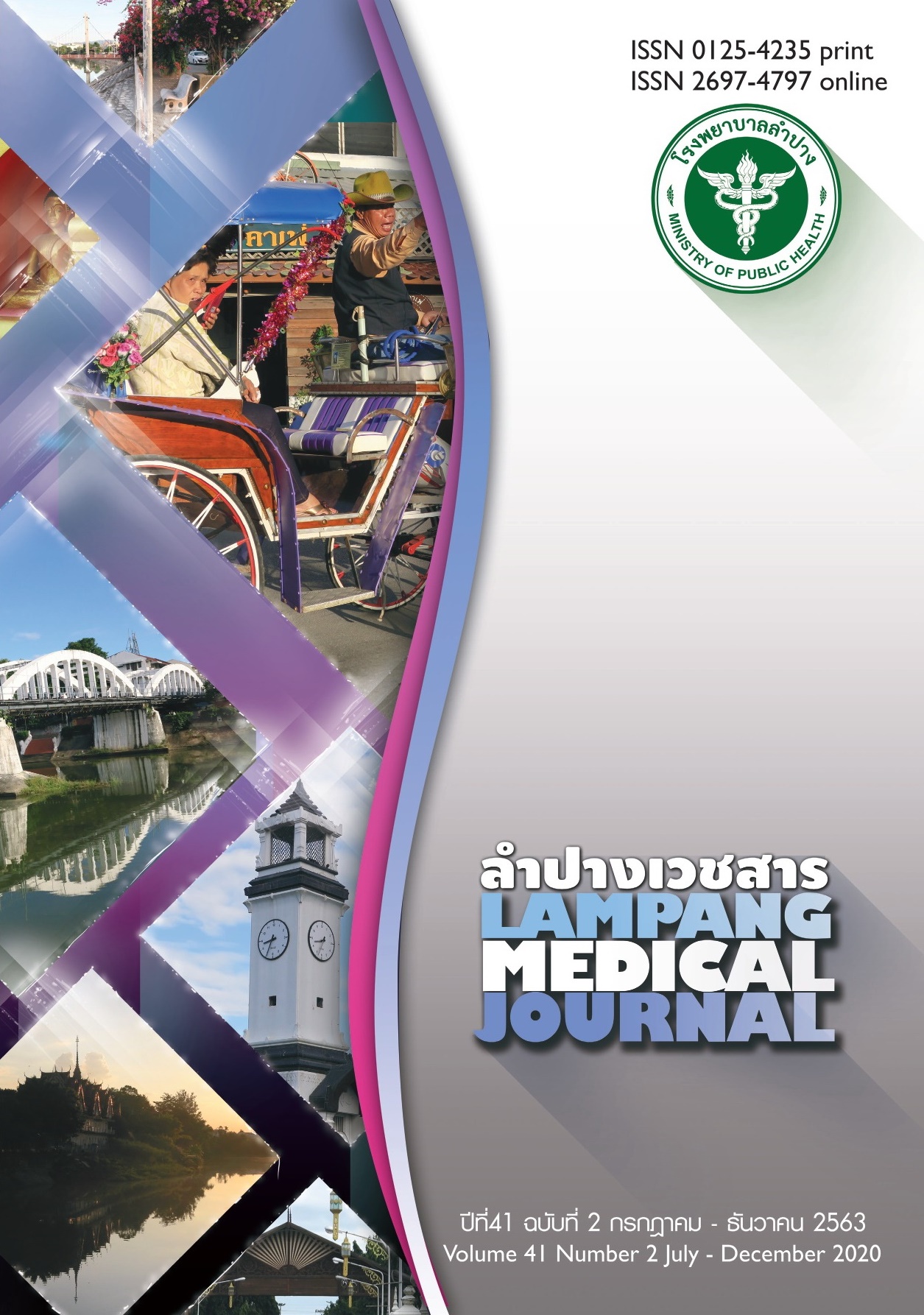Associated Factors and Impacts of Inappropriate Use of Antibiotics after Documented Gram-Negative Bacteremia at the Medical Wards of Lampang Hospital
Main Article Content
Abstract
Background: Antimicrobial resistance due to inappropriate use of antibiotics in gram-negative bacteremia is recognized as a growing and significant healthcare problem.
Objective: To determine the prevalence, associated factors and treatment outcomes of the inappropriate use of antibiotics after documented gramnegative bacteremia.
Material and method: A retrospective cohort study was conducted among patients over 18 years of age who received antibiotic medication for gram-negative bacteremia at Lampang Hospital between 1 January and 30 April 2020. Appropriateness of antibiotic usage was assessed after bacterial identification and drug susceptibility had been documented. Data was statistically compared between the appropriate-usage group and the inappropriate-usage group. Factors associated with inappropriate prescriptions were analyzed.
Results: Among 117 patients enrolled the study, 82 cases were male (70.9%) and the mean age was 65 ± 16.6 years (range, 23-92). The most common pathogens were Escherichia coli 33 cases (28.2%), ESBL producing Escherichia coli 22 cases (18.8%) and Klebsiella pneumoniae 14 cases (12.0%). Inappropriate
prescriptions were found in 68 cases (58.1%). The most common causes were too broad spectrum 34 cases (50%), failure of switching to oral antibiotics 16 cases (23.5%), and ineffective against isolated pathogens 13 cases (19.1%). Factors associated with inappropriate prescriptions were cardiovascular disease (OR 4.6, 95%CI 1.00-20.40, p=0.042) and history of antibiotic utilization 7-days prior to admission (OR 5.9, 95%CI 1.21-29.14, p=0.030). Drug-resistant pathogens were more frequently developed in the inappropriate-usage group than the appropriate-usage group (82.5% vs 7.5%, p<0.001), as well as the
readmission rate (p=0.035).
Conclusions: The prevalence of inappropriate use of antibiotics for treating documented gram-negative bacteremia was as high as 58% of cases, leading to higher incidences of drug-resistant pathogens and readmission rates. Cardiovascular disease and history of antibiotic utilization 7-days prior to admission were significant associated factors.
Article Details
บทความที่ส่งมาลงพิมพ์ต้องไม่เคยพิมพ์หรือกำลังได้รับการพิจารณาตีพิมพ์ในวารสารอื่น เนื้อหาในบทความต้องเป็นผลงานของผู้นิพนธ์เอง ไม่ได้ลอกเลียนหรือตัดทอนจากบทความอื่น โดยไม่ได้รับอนุญาตหรือไม่ได้อ้างอิงอย่างเหมาะสม การแก้ไขหรือให้ข้อมูลเพิ่มเติมแก่กองบรรณาธิการ จะต้องเสร็จสิ้นเป็นที่เรียบร้อยก่อนจะได้รับพิจารณาตีพิมพ์ และบทความที่ตีพิมพ์แล้วเป็นสมบัติ ของลำปางเวชสาร
References
Pumart P, Phodha P, Thamlikitkul V, Riewpaiboon A, Prakongsai P, Limwattananon S. Health and economic impacts of antimicrobial in Thailand. J Health Syst Res. 2012;9:352–60.
Udomthavornsuk B, Tatsanavivat P, Patjanasoontorn B, Khomthong R, Bhuripanyo K, Saengnipanthkul S, et al. Antibiotic use at a university hospital. Antibiotic Working Group of Srinagarind Hospital. J Med Assoc Thai. 1990;73(3):168–74.
Apisarnthanarak A, Danchaivijitr S, Bailey TC, Fraser VJ. Inappropriate antibiotic use in a tertiary care center in Thailand: an incidence study and review of experience in Thailand. Infect Control Hosp Epidemiol. 2006;27(4):416–20.
Apisarnthanarak A, Danchaivijitr S, Khawcharoenporn T, Limsrivilai J, Warachan B, Bailey TC, et al. Effectiveness of education and an antibioticcontrol program in a tertiary care hospital in Thailand. Clin Infect Dis. 2006;42(6):768–75.
Thamlikitkul V, Danchaivijitr S, Kongpattanakul S, Ckokloikaew S. Impact of an educational program on antibiotic use in a tertiary care hospital in a developing country. J Clin Epidemiol. 1998;51(9):773–8.
Apisarnthanarak A, Mundy LM. Prevalence, treatment, and outcome of infection due to extended-spectrum Beta-lactamase–producing microorganisms. Infect Control Hosp Epidemiol. 2006;27(3):326–7.
Morris S, Cerceo E. Trends, epidemiology, and management of multi-drug resistant gram-negative bacterial infections in the hospitalized setting. Antibiotics (Basel). 2020;9(4):196.
Shorr AF, Micek ST, Welch EC, Doherty JA, Reichley RM, Kollef MH. Inappropriate antibiotic therapy in gram-negative sepsis increases hospital length of stay. J Crit Care Med. 2011;39(1):46–51.
Sexton DJ, Miller BA, Anderson DJ. Measuring the effect of inappropriate initial antibiotic therapy on outcomes of patients with gram-negative sepsis: an imprecise science. J Crit Care Med. 2011;39(1):199–200.
Horan TC, Andrus M, Dudeck MA. CDC/NHSN surveillance definition of health care–associated infection and criteria for specific types of infections in the acute care setting. Am J Infect Control. 2008;36(5):309–32.
Blinova E, Lau E, Bitnun A, Cox P, Schwartz S, Atenafu E, et al. Point prevalence survey of antimicrobial utilization in the cardiac and pediatric critical care unit. Pediatr Crit Care Med. 2013;14(6):e2808.
Shime N, Kosaka T, Fujita N. De-escalation of antimicrobial therapy for bacteremia due to difficult-to-treat gram-negative bacilli. Infection. 2013;41(1):203–10.
Lee CC, Lee NY, Chen PL, Hong MY, Chan TY, Chi CH, et al. Impact of antimicrobial strategies on clinical outcomes of adults with septic shock and community-onset Enterobacteriaceae bacteremia: de-escalation is beneficial. Diagn Microbiol Infect Dis. 2015;82(2):158–64.
Aswapokee N, Vaithayapichet S, Heller RF. Pattern of antibiotic use in medical wards of a university hospital, Bangkok, Thailand. Rev Infect Dis. 1990;12(1):136–41.
Mahatumarat T, Pinmanee N, Injai W, Chaiwarith R. Inappropriateness of intravenous antibiotic prescriptions at hospital discharge at a tertiary care hospital in Thailand. Drug Healthc Patient Saf. 2019;11:125–9.
Béïque L, Zvonar R. Addressing concerns about changing the route of antimicrobial administration from intravenous to oral in adult inpatients. Can J Hosp Pharm. 2015;68(4):318–26.
Hsueh PR, Chen WH, Luh KT. Relationships between antimicrobial use and antimicrobial resistance in gram-negative bacteria causing nosocomial infections from 1991–2003 at a university hospital in Taiwan. Int J Antimicrob Agents. 2005;26(6):463–72.
Shime N, Satake S, Fujita N. De-escalation of antimicrobials in the treatment of bacteraemia due to antibiotic-sensitive pathogens in immunocompetent patients. Infection. 2011;39(4):319–25.
Seah VXF, Ong RYL, Lim ASY, Chong CY, Tan NWH, Thoon KC. Impact of a carbapenem antimicrobial stewardship program on patient outcomes. Antimicrob Agents Chemother. 2017;61(9):717–26


